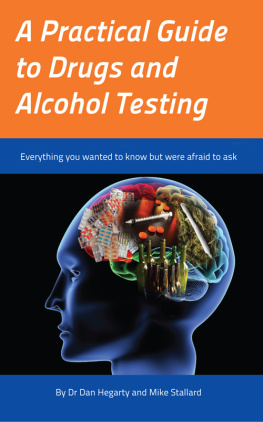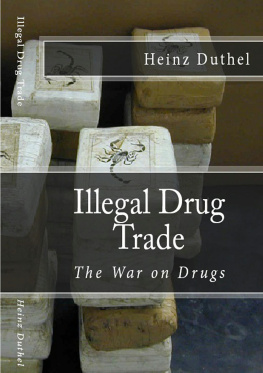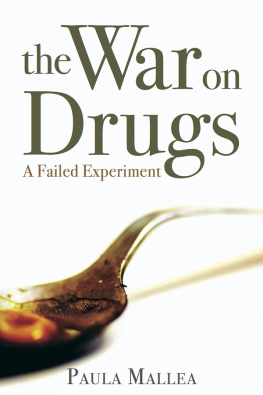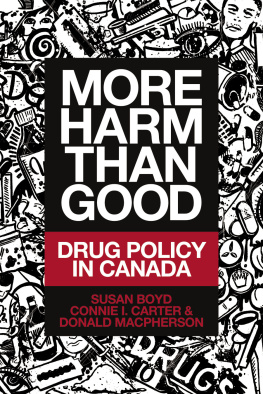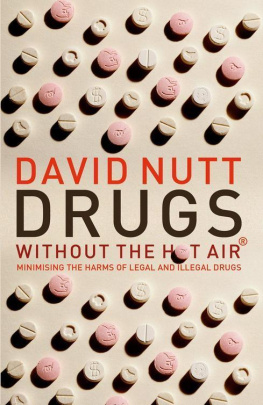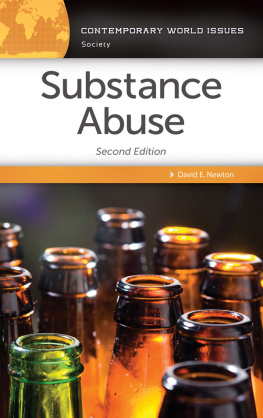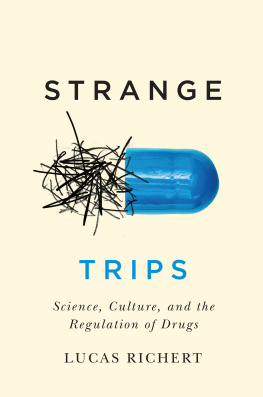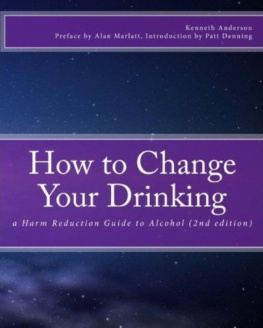
Drugs, Law, People, Place and the State
Though any psychoactive substance can be revered or reviled as a drug, as peoples cultural norms shift, ultimately its status is determined in law by the state. This publication explores the regulation of drugs alcohol and cannabis to heroin and cocaine and practices such as social drinking and public injecting under political regimes. Drugs are discussed in their geographical contexts: the colonial legacy of cannabis prohibition for bioprospecting in Africa, the veracity of the persistent notion of the narco-state, Turkeys governance of drinking amid civil unrest and alcohols place in the neoliberal political economy of Ireland. In addition, drug policies are examined: from problems in managing drug-related litter in the United Kingdom to supervised injecting facility provision in Australia, harm reduction in Canada and the global network of drug policy activists. Place is significant, but porous borders, territorial overlaps and multi-scalar linkages are influential in remaking the world through current challenges to the war on drugs. This book was originally published as a special issue of Space & Polity.
Stewart Williams is a Senior Lecturer in the School of Land and Food, University of Tasmania, Australia. He is interested in matters of risk, regulation and resilience from the perspective of public policy and spatial planning. He has combined critical social theory with mixed research methods to analyse housing and homelessness, climate change and disaster management, community decline and regeneration, and drug production and consumption.
Barney Warf is a Professor at the Department of Geography and Atmospheric Science, University of Kansas, USA. His research concerns producer services and telecommunications, particularly the geographies of the Internet, including the digital divide, e-government and Internet censorship. He examines these topics, and others such as political geography, religion, cosmopolitanism and corruption, through the lens of political economy and social theory.
First published 2017
by Routledge
2 Park Square, Milton Park, Abingdon, Oxon, OX14 4RN, UK
and by Routledge
711 Third Avenue, New York, NY 10017, USA
Routledge is an imprint of the Taylor & Francis Group, an informa business
2017 Taylor & Francis
All rights reserved. No part of this book may be reprinted or reproduced or utilised in any form or by any electronic, mechanical, or other means, now known or hereafter invented, including photocopying and recording, or in any information storage or retrieval system, without permission in writing from the publishers.
Trademark notice: Product or corporate names may be trademarks or registered trademarks, and are used only for identification and explanation without intent to infringe.
British Library Cataloguing in Publication Data
A catalogue record for this book is available from the British Library
ISBN 13: 978-1-138-70045-1
Typeset in TimesNewRomanPS
by diacriTech, Chennai
Publishers Note
The publisher accepts responsibility for any inconsistencies that may have arisen during the conversion of this book from journal articles to book chapters, namely the possible inclusion of journal terminology.
Disclaimer
Every effort has been made to contact copyright holders for their permission to reprint material in this book. The publishers would be grateful to hear from any copyright holder who is not here acknowledged and will undertake to rectify any errors or omissions in future editions of this book.
Contents
Stewart Williams and Barney Warf
Chris S. Duvall
Pierre-Arnaud Chouvy
Emine . Evered and Kyle T. Evered
Julien Mercille
Stephen Parkin
Stewart Williams
Andrew Longhurst and Eugene McCann
Cristina Temenos
Barney Warf and Stewart Williams
The following chapters were originally published in Space & Polity, volume 20, issue 1 (April 2016). When citing this material, please use the original page numbering for each article, as follows:
Stewart Williams and Barney Warf
Space & Polity, volume 20, issue 1 (April 2016) pp. 19
Chris S. Duvall
Space & Polity, volume 20, issue 1 (April 2016) pp. 1025
Pierre-Arnaud Chouvy
Space & Polity, volume 20, issue 1 (April 2016) pp. 2638
Emine . Evered and Kyle T. Evered
Space & Polity, volume 20, issue 1 (April 2016) pp. 3958
Julien Mercille
Space & Polity, volume 20, issue 1 (April 2016) pp. 5974
Stephen Parkin
Space & Polity, volume 20, issue 1 (April 2016) pp. 7594
Stewart Williams
Space & Polity, volume 20, issue 1 (April 2016) pp. 95108
Andrew Longhurst and Eugene McCann
Space & Polity, volume 20, issue 1 (April 2016) pp. 109123
Cristina Temenos
Space & Polity, volume 20, issue 1 (April 2016) pp. 124141
For any permission-related enquiries please visit:
http://www.tandfonline.com/page/help/permissions
Pierre-Arnaud Chouvy is a geographer and specialist in the (geo)politics of illegal drug production in Asia. He is currently a research fellow with the French National Centre for Scientific Research (CNRS) in Paris, France. His work can be consulted on www.geopium.org and includes such books as Opium: Uncovering the Politics of the Poppy (2010).
Chris S. Duvall is an Associate Professor in the Department of Geography and Environmental Studies, University of New Mexico, USA. His research focuses on humanplant interactions, primarily in Africa and amongst the African Atlantic Diaspora. His current work focuses on the historical geography of cannabis. Dr. Duvalls publications on the topic include the book Cannabis (2015), and one forthcoming on the historical geography of cannabis in Africa (expected 2018).
Emine . Evered is an Associate Professor in the Department of History, Michigan State University, USA. A historian of the modern Middle East, she focuses on late Ottoman and early republican Turkey. Her Empire and Education Under the Ottomans (2012) examined educational policy and schooling in terms of societystate relations, identity politics and international affairs. Her research interests extend to public health, disease, sexuality and sex work, and intoxicants. A second book will address the rise and fall of prohibition in the early Turkish republic.
Kyle T. Evered is an Associate Professor in the Department of Geography, Environment, and Spatial Sciences, Michigan State University, USA. Trained in geographies of the Middle East, North Africa and the former Soviet states of Eurasia, his research concerns the cultural and historical geographies, political geographies and cultural ecologies of Turkey and its neighbouring states and wider regions. Specific interests include geographies of the opium poppy, health and well-being, and identityplace constructs such as nationalism, territoriality and regionalism.
Andrew Longhurst is a researcher and policy analyst at the Health Sciences Association of British Columbia and a research associate with the British Columbia Office of the Canadian Centre for Policy Alternatives in Vancouver, Canada. His research focuses on the spatial and politicaleconomic dimensions of health and social policy, poverty and inequality, and labour market change.


